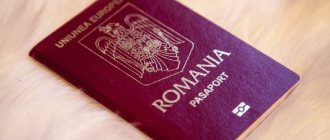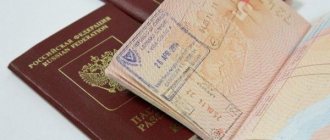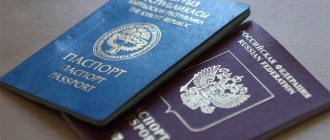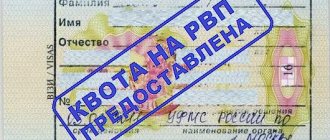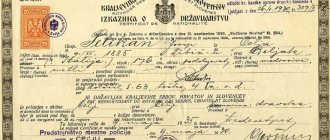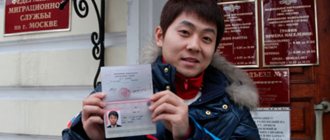The best cities for moving to permanent residence in Russia
The choice of city to move to is determined, first of all, by the goals pursued. And if for young people the priority, most often, is a profitable job, opportunities for career growth and self-realization, then for those who have already completed their working career, the quality of life and health comes to the fore. Developed infrastructure and a prosperous social climate are perhaps important for everyone.
So, when talking about where it is better for young people to go, we take into account cities with developed economies, high salaries and a labor market that can offer vacancies for representatives of a wide variety of professions. Let's see which cities are in the TOP 5 for young people to move to in accordance with the described criteria.
Moscow
- Migrants in Russia
Sakharovo Migration Center in Moscow: address, opening hours, contacts, services
- Elena Voropaeva
- 21.05.2020
The average salary in Moscow at the beginning of 2021 was 88.9 thousand rubles. Of course, we all know how averages are calculated, but it’s not just about the earnings indicator itself. Moscow has the best wage-price ratio in Russia (in second place in this ranking, by the way, is Yuzhno-Sakhalinsk). It also has the highest number of job openings every month. Even very young people without any special education or experience can find a job here with a salary of 50,000 rubles. Opportunities for learning and enjoyable leisure time here are limited only by money. The climate in the capital of All Rus' is moderate: severe frosts as well as heat are rare here.
Significant disadvantages include huge distances and heavy traffic. Stories about how the journey from home to work and back takes 4-5 hours have long become classics.
A Muscovite once told me that he gets up at 3 am, drives 1.5 hours to work and sleeps in the car until 8:30 - before the start of the working day - because if he leaves at least at 5, he will be stuck in a traffic jam for an hour by 4.
Rent of a one-room apartment: about 36,000 rub.
Buying a one-room apartment: about 7,500,000 rubles.
Cost of the consumer basket: 17129 rub.
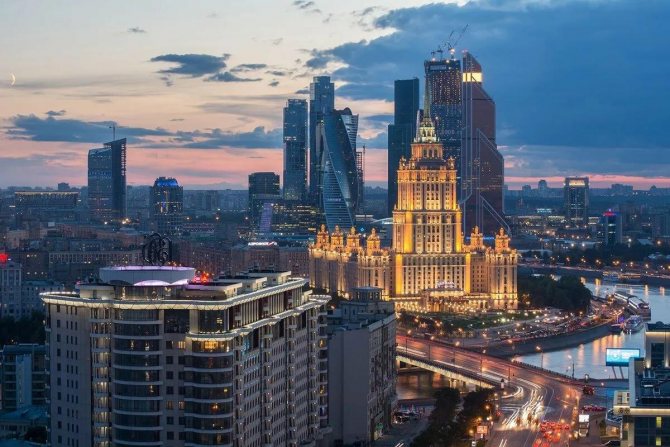
Every year 1.5 - 2 million people come to the capital.
Saint Petersburg
- Personal experience
Personal experience of moving to St. Petersburg: housing, registration, prices, salaries
- Marina Danilova
- 05.02.2020
The average salary is about 60 thousand rubles. In terms of the ratio of salaries and prices, the northern capital is only in 7th place on the list. But in terms of the number of open vacancies, St. Petersburg consistently ranks 2nd after Moscow. It has one of the lowest unemployment rates in the country - only 1.4%. Service sector workers, sales managers, programmers and other representatives of the IT sector are always in demand. In terms of richness of cultural life, St. Petersburg is ahead of Moscow, so “people of art,” both amateurs and professionals, always have something to do here. For those who like to travel around Europe, the proximity to Finland and Estonia will be a plus, the airports of which can be used to save money on flights.
There are traffic jams in the city, but for car enthusiasts. Those who use public transport most often arrive at their destination when they plan.
One of the obvious disadvantages is the climate. Even those coming from the north have a hard time getting used to the damp air and constant precipitation.
Rent of a one-room apartment: 25,000 rub.
Buying a one-room apartment: about 4,500,000 rubles.
Cost of the consumer basket: 11,561 rubles.
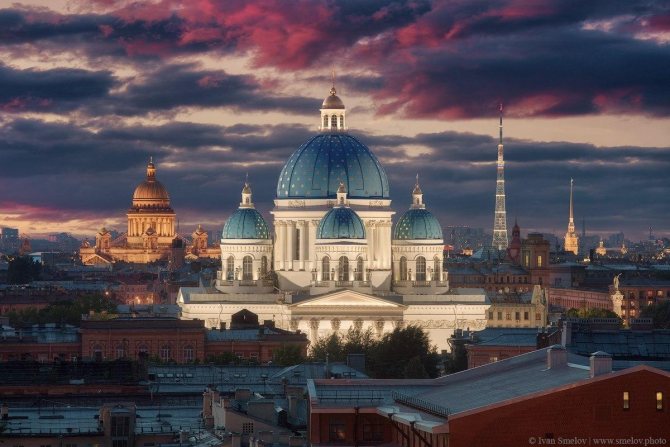
St. Petersburg will appeal to those who love long walks.
Ekaterinburg
- Migrants in Russia
Obtaining citizenship in Yekaterinburg: organizations, addresses, documents
- Alena Motroy
- 23.11.2019
The economy of Yekaterinburg ranks 3rd in the country. The average salary here is 41,000 rubles. In terms of the number of open vacancies, the Ural city is in 4th place. Specialists in the field of construction, real estate, logistics, IT and sales are in demand here. The city has developed street art, of which Yekaterinburg is proud. A developed system of ground transport and metro allows you to move around the city at optimal speed. The climate in the city is harsh and clearly differs by season: severe frosts in winter and quite hot in summer.
Bonus: the Ural mountains, endless forests and fast rivers, which will surely appeal to lovers of active “wild” recreation.
Rent of a one-room apartment: 17,000 rub.
Buying a one-room apartment: about 2,700,000 rubles.
Cost of the consumer basket: 11280 rub.
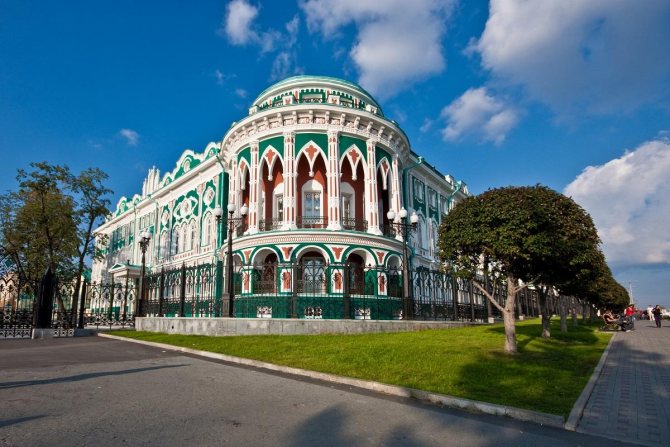
Ekaterinburg is among the top 600 largest cities in the world, which together provide 60% of global GDP
Tyumen
- Migrants in Russia
How to get a temporary residence permit in Tyumen and the region
- Alena Motroy
- 12.12.2019
The average salary in Tyumen is about 40,000 rubles. But in the ranking of price/wage ratios it is in the top ten. This West Siberian city was recognized as the best place to live in Russia for 2 years in a row (in 2015 and 2016). The quality of roads and housing, the convenience of infrastructure and residents’ satisfaction with the work of public utilities were assessed. In Tyumen, blue-collar jobs, as well as specialists from the fields of construction and manufacturing, are in demand. The climate in Tyumen is closer to sharply continental, with cold winters and hot summers, but with fairly dry air, temperature changes are relatively easily tolerated.
The main disadvantage of the city is the environmental situation. There is low quality water and dirty air due to the huge number of metallurgical, oil and other industrial enterprises.
Rent of a one-room apartment: 19,000 rub.
Buying a one-room apartment: about 2,800,000 rubles.
Cost of the consumer basket: 11222 rub.
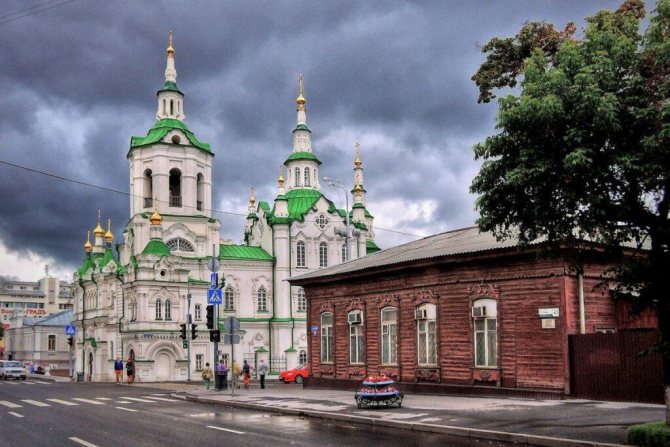
Tyumen is the unofficial oil and gas capital of Russia.
Krasnodar
- Migrants in Russia
How to apply for a residence permit in Krasnodar
- Marina Danilova
- 06.12.2019
For those who want to go where it is warmer. In addition to the excellent climate, the ecological situation here is relatively good for a metropolis, and it’s only 100 km from the sea. The average salary here is about 35,000 rubles; specialists in the field of construction and maintenance of residential real estate (electricians, plumbers, realtors, etc.), as well as sales workers, are in demand. Finding a job here is easier than in other cities of the Krasnodar Territory, but it cannot be said that workers here are being torn away.
Krasnodar is developing rapidly, but the city's infrastructure does not keep pace with population growth: the main disadvantage of the city is the lack of kindergartens, schools and clinics, and there are often traffic jams on the roads.
Rent of a one-room apartment: 20 - 25,000 rub. (depending on the season)
Buying a one-room apartment: about 2,200,000 rubles.
Cost of the consumer basket: 11,000 rub.
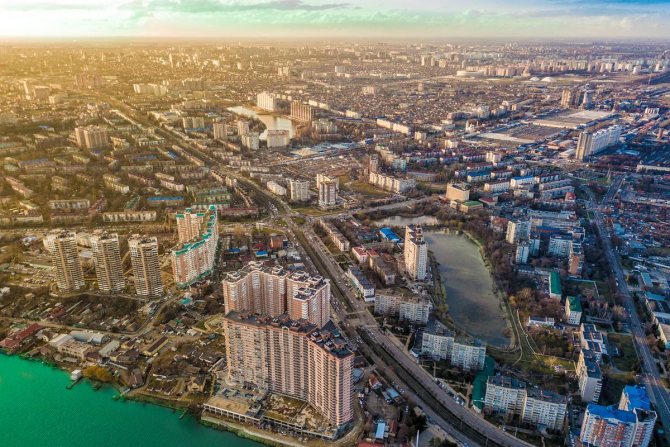
Krasnodar is located on the “golden line”. This is the name given to the 45th parallel, which is located midway between the North Pole and the equator. This explains the city's mild climate.
When talking about where to move for pensioners in the Russian Federation, you need to take into account slightly different criteria. Namely, the size of pensions, the level of expenses, the environmental and social situation of the locality, the convenience of infrastructure, the level of medical care and the variety of leisure activities. It is difficult to compare cities on these points, but attempts have been made. In 2015, the Center for the Study of Pension Reform compiled a rating of the social well-being of pensioners by region. His main criterion was the ratio of prices and average pension. The top five included:
- Irkutsk region (there are subsidies for residents of the Far North, low prices for housing and communal services and food);
- Bryansk region;
- Tula region;
- Nizhny Novgorod Region;
- Republic of Bashkortostan;
Interestingly, the maximum average pension was recorded in completely different regions. Namely:
- Chukotka Autonomous Okrug - 25,893;
- Nenets Autonomous Okrug - 23,090;
- Magadan region - 22,913;
- Kamchatka Territory - 22,630;
- Khanty-Mansi Autonomous Okrug-Yugra - 22,226;
Probably the northern regions are losing in other indicators.
As for the most favorable environmental situation, the leading places in the ranking were taken by Mineralnye Vody, Sochi, Kostroma and Taganrog. In many lists of cities where it is better for retirees to move, Belgorod often appears - a green, clean and not too fussy city.
Anton Ventura-Traveset, 27 years old, hometown Barcelona, client manager
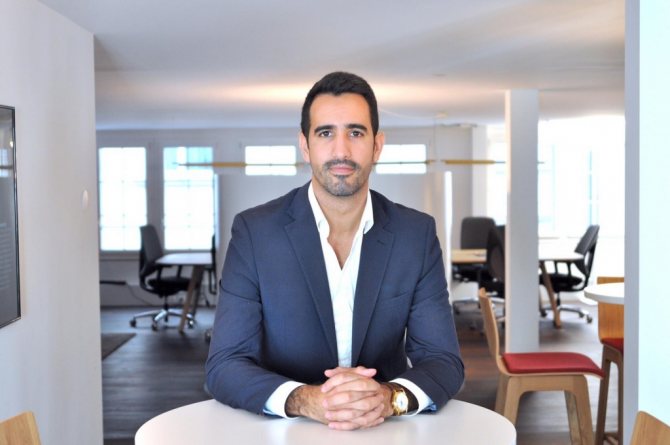
I was born in Barcelona, Catalonia, and lived there until I was 24 years old.
I decided to move to Russia after I graduated from university in 2014. In September I moved to St. Petersburg, where I studied and worked at the same time.
I went to Russia to get to know this country and learn Russian.
There were three reasons for this. Firstly, everyone knows that Russia is a rich and strong country. Therefore, if you manage to learn Russian, you can become successful in business. Secondly, I like learning languages, and I knew that knowing Russian would allow me to work wherever I wanted, especially in Barcelona. This would be my advantage over others. Thirdly, my grandfather was half Russian, but was born in Barcelona. In 1936, he was sent to Russia due to the civil war in our country. When he left, he was 9, and he returned to Spain at 29 years old.
About difficulties
I got used to the weather easily, but it was difficult to get used to the bureaucracy.
At the very beginning, when I first moved, difficulties arose due to the language barrier. People in Russia practically do not speak English. Apart from this, there were no particular difficulties.
About the peculiarities of culture
Barcelona is home to kind and cheerful people, we have warm weather and a good standard of living.
Spain is in first place in the ranking of countries in terms of life expectancy.
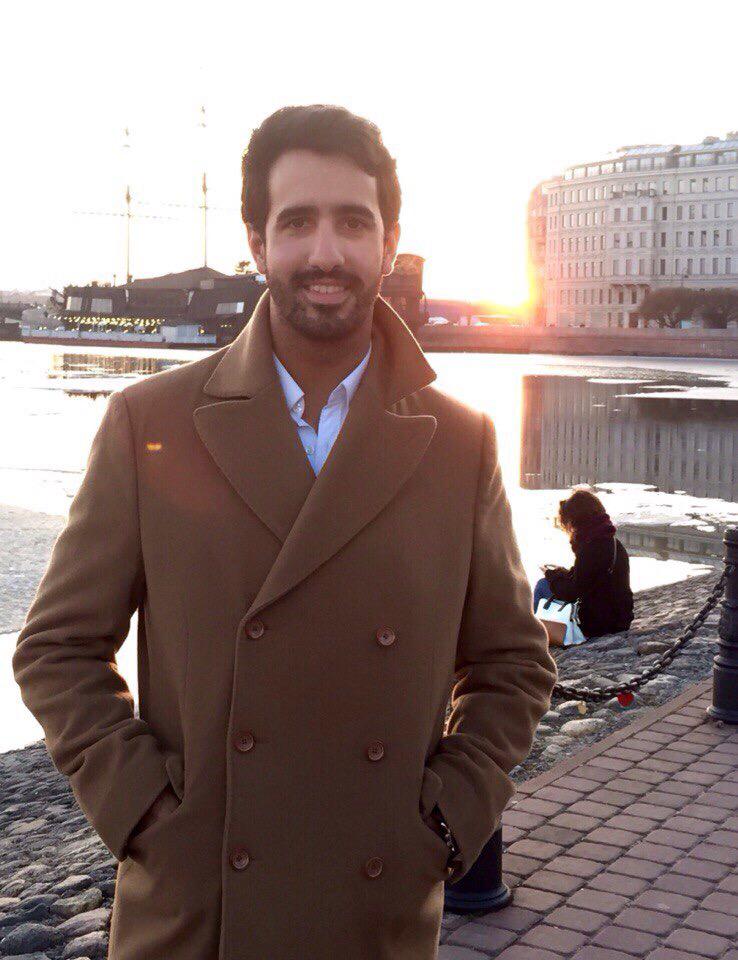
In Russia I missed Spanish jamon.
Russian cuisine is different; it was difficult to find a good restaurant with Spanish cuisine.
There are also differences in lifestyle in Russia and Spain. I think people live differently because of the weather. But I love both countries and I think that you can live well in both.
About Russia
I attended courses at the Faculty of Philology of St. Petersburg State University for about nine months.
It was helpful. What I learned in the morning I could use in the evening when talking with friends or people on the street.
I liked everything about Russia because it is close to my heart. Since childhood, I have seen Russian culture in my home. Besides, good people live in Russia. What I like most about this country is the language, people, minibuses, Georgian and Russian cuisine.
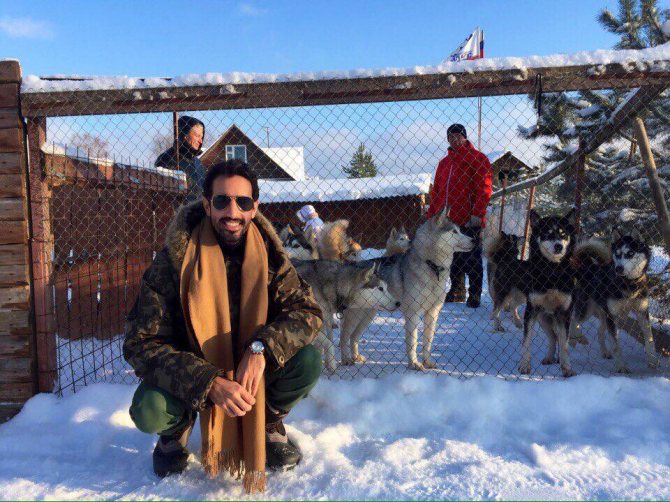
People think that Russia is another planet. But this is not so, the same people live here.
What do you need to move to the Russian Federation for permanent residence?
Where to start moving? Most likely from choosing a region and collecting information about the legalization process. Do you want to move right away or are you thinking about looking around first? In the first case, you can collect documents for leaving for permanent residence in the country of origin, in the second - do this gradually, already in Russia. Certain categories of citizens, for example those who qualify for the resettlement program for compatriots, can even obtain a Russian passport without entering the Russian Federation! In general, we can name 6 main ways to move to Russia for permanent residence:
- Take part in the State Resettlement Program (documents can be issued both at home and while in the Russian Federation. Suitable for former citizens of the USSR living in the territory of the republics of the former Union, as well as for emigrants from the Russian state, the Russian Republic, the RSFSR, the USSR and the Russian Federation and members of their families). Does not work in all regions. Most often, it is older people who can initiate participation in the program and “transport” their children and grandchildren with them.
- Obtaining temporary asylum (for residents of Ukraine).
- Registration of refugee status (for those who are persecuted by the authorities of their own country).
- Acquiring citizenship or residence permit in a simplified manner (takes from one to three years and is suitable for close relatives of citizens of the Russian Federation and native speakers of the Russian language).
- Acquiring citizenship or residence permit in the general manner (takes 5 - 7 years. Suitable for any foreign citizens and stateless persons).
Please review the terms and requirements of each option carefully and evaluate how your situation fits one of them. Having decided on the legalization option, you can begin collecting documents. The packages of papers for the first five cases can be viewed by clicking on the item of interest. We will describe the main stages of moving to permanent residence in general below:
- You enter the Russian Federation (with or without a visa) and receive a migration card. With it, you will register for migration within 7 days.
- Foreigners of working age planning to work in the Russian Federation apply for a patent or work permit (not required for residents of the EAEU countries). You must apply for a patent within 30 days from the date of entry. You don’t need more to get a job (TIN and SNILS are issued by employers). A patent is issued for a maximum of one year with the possibility of extending it once for another 12 months. The work permit is valid from 1 to 3 years, depending on the category of the employee. If your ultimate goal is to move to permanent residence, then this is only the initial stage.
- Next, you need to obtain a temporary residence permit (with or without a quota). Once you receive it, you will no longer need a work permit or patent. The temporary residence permit is valid for 3 years with the need for annual confirmation.
- At least 8 months after the temporary residence permit is in hand, the foreigner has the right to apply for a residence permit. The application is processed within 4 months.
- Since 2021, the residence permit has become unlimited. This means that with this document you can live in the Russian Federation as long as you like, provided that you confirm it once a year. Some foreigners stop at this stage. But if your goal is a Russian passport, then if you have a residence permit, you have the right to apply for citizenship.
- After receiving a residence permit or citizenship, pensioners are removed from the pension register in the territory of their state and can process payments in the territory of the Federation. We'll talk about this a little later.
Remember that the migration legislation of the Russian Federation and local administrative acts regulating the state’s relations with foreigners are often subject to adjustments. Today you can bring one set of documents and it will be accepted, but in a week the requirements will change. Follow the news and be sure to check information on official sources.
And one more thing - it’s impossible to entrust the unpleasant procedure of waiting in line and filling out papers to anyone. Even for a fee. The personal presence of the applicant is required everywhere, unless he is a minor or incompetent.
USA
A doctor's diploma in Russia or any CIS country is recognized as a medical doctor (MD). This means that by completing additional education in the USA you will be eligible for this job. You can come to this country through any of the postgraduate study programs, which include:
- Master's degree
- Postgraduate studies
- Postdoctoral studies
- Medical residency
A master's degree will cost you $15,000-120,000 per year. Graduate school will cost $24,000-$45,000 per year. The study schedule is quite intensive.
Another unusual format for us is Postdoctoral Studies. (Postdoctoral Fellowship). It is suitable for those who aspire to a scientific career. In this case, the university hires you as a researcher in one of its departments. You will receive a salary of up to $120,000 per year. Your tasks will include conducting research, writing articles and publications for specialized medical publications.
If you decide to become a doctor in the USA
A practicing doctor must have a license. The first step to achieve this is to take the USMLE exams. Then you need to enter a residency program for a period of 3 to 7 years. The US Commission recognizes diplomas from all major medical universities in Russia, Ukraine and the USA.
The USMLE exams cover both general knowledge of anatomy and physiology and applied and practical skills. They are called clinical knowledge and clinical skills. The English language is tested in parallel during your dialogues about medicine. At this stage you will need money. The exam fee is $3,385 and each interview application is $30.
The statistics are such that, having submitted up to 100 applications, you can receive only 5-6 invitations to face-to-face interviews.
The competition is the highest and attempts are being made by residents all over the Planet.
For example, at the University of New Mexico, the residency program received more than 1,000 applications from all over the world. Of these, 69 were invited for interviews, and in the end there were only 9 left. Feedback from American professors and your professional connections are very helpful. Any person who wants to be successful in the USA must skillfully use networking.
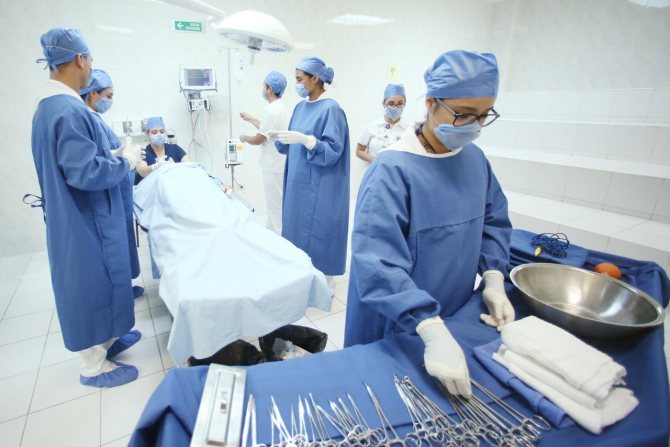
Features of moving to Russia for permanent residence for pensioners
- GCitizenship
How can a foreign pensioner become a citizen of the Russian Federation?
- Elena Voropaeva
- 04.08.2020
Between Russia and the states of the former USSR (except Azerbaijan) there are international agreements that stipulate pension provision for people moving for permanent residence. As a rule, the pension is paid according to the laws of the state where the migrant lives permanently. For example, the retirement age in Russia is 65 years for men and 60 for women. And in Ukraine this age is the same for both sexes and is 60 years. This means that when moving to the Russian Federation, a 61-year-old man who has already retired in his homeland will not be considered a pensioner until he is 65 years old. Accordingly, he will not be able to receive pension payments. The size of the pension will also depend on the pension standards of the Russian Federation. You cannot receive pensions in two states - this is punishable by the court. Despite this, such cases pop up all the time.
To transfer a pension, you don’t have to wait for your passport - you can do this already with a residence permit. To do this you need:
- Deregister from the pension register in your country and receive a document confirming this;
- Contact the Pension Fund at the place of registration and submit an application for pension transfer.
Moving to Russia from Belarus
- GCitizenship
Ways to obtain Russian citizenship for Belarusians
- Elena Voropaeva
- 04.08.2020
There is an agreement between the Russian Federation and the Republic of Belarus, thanks to which Belarusians can freely enter the territory of the Federation without completing any documents or filling out migration cards. They have the right not to register for migration for up to 90 days, and they do not need patents or work permits to get a job. Moreover, according to Article 4 of the “Agreement between the Russian Federation and the Republic of Belarus on ensuring equal rights of citizens of the Russian Federation and the Republic of Belarus to freedom of movement, choice of place of stay and residence in the territories of member states of the Union State,” Belarusians have the right to obtain a residence permit bypassing the stage of temporary residence permit. The period for consideration of an application for a residence permit is 3 months.
In terms of obtaining citizenship, special conditions also apply for Belarusians. From July 2021, they can obtain a Russian passport in a simplified manner. The basis will be the presence of a passport of a citizen of the Republic of Belarus.
There are other reasons. For example, the procedure can be simplified by:
- citizens of Belarus who previously had Soviet passports and were citizens of the RSFSR, Belarusian, Kazakh or Kyrgyz SSR;
- those born and residing in the Russian Federation as of December 21, 1991;
- having close Russian relatives.
Documents for the simplified acquisition of Russian citizenship are reviewed within 3 months.
Thus, the final move for permanent residence from Belarus to the neighboring Federation can be accomplished in a little more than 1 year.
Human “capital” is more valuable than money
Sergei Ryazantsev, corresponding member of the Russian Academy of Sciences, director of the Institute of Social and Political Research of the Russian Academy of Sciences:
I completely agree with the main message of the document: “spot changes in migration legislation, as well as toughening of legal liability, will not lead to a qualitative improvement in the state of the migration sphere.”
The efforts of the state should be aimed at ensuring that people want to come to Russia and stay with us. It is reasonable to declare that we are gathering Russians in Russia and inviting respectable people of different nationalities to come to us to work, do business, study... To implement such a policy, we need an independent civil structure - the Ministry of Migration and Naturalization.
So far, unfortunately, the power aspect dominates in the proposed measures.
It is, of course, necessary to introduce fingerprinting and unified information platforms, but there is a risk that the security component will again bury the idea that migrants are the country’s precious human capital, demographic and labor resources.
The less migrants have to communicate with officials, the less corruption and arbitrariness there will be. A person must submit his documents electronically, this will allow him to get rid of queues and even eliminate corruption!
A person with a residence permit may be deprived of his legal status for crossing the street in the wrong place
This is a serious step forward, that a residence permit will become the main migration status, and a temporary residence permit - a temporary residence permit, as an extra step on the path to citizenship (and this temporary residence permit is also issued within the narrow framework of quotas) will now wither away. However, you need to think in advance: what will happen to people who are now living with temporary residence permit status? I think that they should be given a residence permit automatically! In addition, it would be good to give residence permits to students who have completed their studies in Russia - this is an excellent demographic, intellectual and labor resource for the country.
It is proposed to establish three methods of admission to Russian citizenship: general, simplified and special. In general, it is additionally proposed to introduce a commission method for assessing applicants for citizenship. A preliminary assessment will be given by a certain commission created at the subject level, and the decision will be made in the Migration Main Directorate of the Ministry of Internal Affairs of Russia and in its territorial bodies. In my opinion, it is simply unreasonable to leave the decision on citizenship, which largely determines a person’s fate, entirely in the hands of police officials. I also doubt that investors and businessmen should be given citizenship (in a special manner) only by the President of the Russian Federation. In general, it seems to me that this category of foreigners should be given Russian citizenship not in a special manner, but in the form of a simplified procedure subject to clear conditions: job creation, purchase of real estate in Russia, investment in production.
The document notes that measures to limit the admission of foreign citizens to the labor market do not apply to citizens of member states of the Eurasian Economic Union. Do such measures apply to foreign citizens who have a residence permit in Russia? What will happen to these people? This simply needs to be specified, otherwise hundreds of thousands of people we need will be stuck in a legal vacuum.
I read the document, but didn’t find a word about free Russian language courses for migrants! But this is a necessary condition for their successful integration!
Moving to Russia from Kazakhstan
When entering Russia, Kazakhstanis receive a migration card and undertake to register for migration within 30 days. You can simply enter with both a passport and an identity card, but if you are planning to draw up any documents in the Russian Federation, you cannot do without a passport.
When getting a job, they pay the same 13% income tax as Russians and are not required to obtain a work permit or patent. Having an official employment contract in hand, you can extend the maximum period of stay - 90 days out of every 180 - up to 1 year.
- GCitizenship
Russian citizenship by agreement for Belarusians, Kazakhs and Kyrgyz
- Elena Voropaeva
- 03.08.2020
If a Kazakh citizen decides to move to Russia for permanent residence, then the first step is to choose the appropriate path of naturalization. For residents of Kazakhstan, a program for the resettlement of compatriots (subject to meeting the requirements), a program for native Russian speakers, as well as a simplified procedure for obtaining citizenship are available.
For Kazakhstanis, as well as for Belarusians, accelerated registration of citizenship is available based on the presence of Kazakhstani citizenship. Therefore, you can apply for citizenship immediately after receiving a residence permit - no five-year wait.
It is impossible to get a red crust and retain citizenship of Kazakhstan - in the Republic of Kazakhstan there is a ban on both dual and second citizenship.
How can an immigrant obtain Russian citizenship?
The other day, Rosstat published data on immigration to Russia this year, from which it follows that in the post-Soviet space, Uzbekistan is in the lead among those countries from which people are moving to live here, and China is in the lead among states outside the former USSR. According to experts, Russian citizenship is attractive only to residents of poor Asian countries.
Even from Ukraine, Belarus and Moldova, people now travel mainly to Europe. To make up for the population decline, officials are looking for Russians all over the world and recently lured Old Believers from Bolivia to Primorye. However, millions of migrants living in Russia for years want, but cannot obtain citizenship due to bureaucratic barriers and are forced to remain illegal immigrants.
In the fight for a Russian passport, 33-year-old Maxim Bannak reached the European Court of Human Rights, where Bannak's complaint was registered last summer. The man was born in Germany and by birthright became a citizen of this country. However, his mother remained a Russian citizen, and Maxim Bannak also received a Russian passport on this basis. However, in 2008, the document issued to Mr. Bannack was canceled due to the fact that, when receiving German citizenship, he did not renounce Russian citizenship, and Russian law allows dual citizenship only “in special cases.” The man lost all the courts in Russia. The Cologne branch of the German Human Rights Union told NI that there are dozens of similar cases. True, the interest of children of Russian citizens living abroad is often selfish - a Russian passport will allow you not to pay for a visa when traveling in the CIS, but for a German, a multiple-entry visa to Russia alone costs $110.
According to Rosstat, in the first half of this year, 159 thousand people received Russian citizenship or a residence permit in our country (statistics do not separate these two categories). An order of magnitude less emigrated from Russia—15.1 thousand people. More emigrants went to the USA, Canada and Finland alone than Russia received from there. The balance is in favor of our country even with Israel, Germany and Greece. However, more than half of the influx of immigrants comes from the Central Asian republics of the former USSR. The leaders are Uzbekistan (28.6 thousand people) and Kyrgyzstan (19.9 thousand). Almost 30 thousand people moved to live in Russia from the countries of Transcaucasia (the leader is Armenia, which was left by 15 thousand citizens). 1.6 thousand people moved to Russia from the former Soviet Baltic republics. Among non-CIS countries, the largest number of immigrants are from China (3 thousand) and Germany (1.9 thousand).
It is primarily residents of Central Asian states who seek to obtain Russian citizenship, Vyacheslav Postavnin, former deputy director of the Federal Migration Service and president of the 21st Century Migration Foundation, tells NI: “It is sometimes easier for citizens of Kyrgyzstan or Kazakhstan to obtain citizenship thanks to bilateral agreements than a work permit " The head of the migration laboratory of the Institute of National Economic Forecasting of the Russian Academy of Sciences, Zhanna Zayonchkovskaya, estimates “NI” the number of potential migrants from the republics of the former USSR at six million people, including 1.5 million ethnic Russians. At the same time, there will not be a large influx from Slavic Ukraine and Belarus: almost everyone who wants to move from these countries to Russia has already done so. Leading researcher at the Institute of Demography of the Higher School of Economics Nikita Mkrtchyan confirms to NI that those leaving Ukraine, Belarus, Moldova and the Baltic republics tend mainly to the countries of the European Union, and not to Russia.
Russia's need for migrants, according to Zhanna Zayonchkovskaya, is a million people a year: due to the demographic gap, the country's working-age population will decrease by 14 million people by 2025, and only a third of this gap can be closed by employing pensioners and housewives. The rest can only be filled by immigrants - 700 thousand labor migrants per year or a million, including the elderly and children.
Such an influx was recorded in Russia only once - in 1994. That year, 236 thousand people moved to Russia from Kazakhstan alone, and 138 thousand from Ukraine. Since then, the number of migrants has decreased from 867 thousand in 1995 to 119 thousand in 2004. Zayonchkovskaya says that the influx of immigrants was influenced by amendments to the laws on citizenship and foreigners. When the laws were tightened, fewer people became Russians or holders of residence permits in Russia; when they were relaxed, more people became Russians. In 2007, the law was relaxed, and immigration jumped to 286 thousand people and has remained at about the same level since then.
The return of Russian diaspora
Hopes for all ethnic Russians from the republics of the former USSR to move to Russia did not come true, Olga Vorobyeva, former deputy director of the Federal Migration Service and head of the department of social statistics and demography of the Russian State University of Social Sciences, tells NI: out of 25 million, only a third returned to Russia - about eight million. Most settled in a new place on their own - moving benefits and interest-free loans for the purchase of housing appeared in the late 90s and were only available to those who received the status of forced migrants.
Now many Russians from the former Soviet republics can no longer be attracted. According to demographer Mkrtchyan, the older generation will not go because they are old; their children will not go because they have settled in those countries and connect their future with them, and not with Russia. In addition, the economic situation in Kazakhstan and Azerbaijan has improved significantly, and the standard of living of many citizens of these republics is close to that of Russia.
Since last year, a program to promote the voluntary resettlement of compatriots to Russia began to operate. Representatives of “peoples historically living on the territory of the Russian Federation” living abroad are considered compatriots. Officials decided not only to replenish Russia with citizens, but also to populate with compatriots those territories where there is not enough population. More than half (55.7%) of applications for participation in the program came from Kazakhstan and Uzbekistan, but in search of compatriots, the Russian Foreign Ministry reached Latin America and last summer resettled a community of Old Believers from Bolivia to Primorye.
Program participants receive a subsidy for the transportation of property, the right to import personal cars duty-free, and local authorities must provide housing for displaced people. In exchange for this, the migrants must live in the new place for at least two years. According to the Ministry of Regional Development, by the middle of this year, 44.2 thousand people moved to Russia under the program for resettling compatriots. However, a third of them chose the Kaliningrad region as their new place of residence, while 32 regions participate in the program. IDPs do not want to go to remote villages in Siberia and the Far East.
Deadline for passport
An immigrant can obtain Russian citizenship in a general or simplified manner. The simplified procedure includes those who have at least one parent living in Russia and is a citizen, citizens of the former USSR who did not receive any other citizenship after the collapse of the country, those born on the territory of the Russian Federation before the collapse of the USSR, graduates of Russian universities, spouses of Russian citizens, those who have been married for at least three years, as well as veterans of the Great Patriotic War permanently residing in the territory of the Russian Federation. Russian legislation is even softer for citizens of Kazakhstan, Kyrgyzstan and Belarus - in order to obtain a Russian passport, in accordance with agreements between these countries and Russia, they only need to renounce their previous citizenship.
The rest need five years to legally live and work in Russia to obtain citizenship. For most migrants, this turns out to be impossible, says Zhanna Zayonchkovskaya: getting a job under an employment contract is difficult, and obtaining temporary registration at the place of residence is even more difficult, since the owners of rental apartments are afraid that the registered migrant will not be able to evict later. As a result, out of approximately 5-7 million foreigners permanently residing in Russia, only a few manage to obtain citizenship. The director of the Center for Ethnopolitical and Regional Studies, Vladimir Mukomel, tells NI that “according to the general procedure,” no more than one hundred people receive citizenship annually—less than 0.1% of the total number of those becoming Russian citizens. The FMS confirmed that over the seven months of this year, 50 people received citizenship in the general order, while in the simplified procedure - 31.6 thousand people, and in accordance with international agreements - 41.7 thousand. According to Mr. Mukomel, becoming A third of migrant workers would like to become Russian citizens; according to Ms. Zayonchkovskaya, half of the migrants would like to live and work in Russia, having a residence permit or a Russian passport.
Several years ago, highly qualified specialists were included in the preferential categories for obtaining a residence permit and then citizenship. However, Russia is not very attractive for them. According to Nikita Mkrtchyan, the number of specialists involved is in the hundreds. According to Rosstat, of the 175.6 thousand people over 14 years of age who moved to Russia last year, only 252 people (less than 0.2%) had academic degrees of candidate or doctor of sciences. The main reason for moving (61.2% of cases) was family circumstances. 2.1 thousand people moved to Russia due to the aggravation of interethnic relations (the leader is Kyrgyzstan, from where 718 people left), 282 - due to rampant crime, 308 - due to “inconsistency with natural and climatic conditions.”
But there are also migrants who are undesirable for the Russian authorities. Demographer Mkrtchyan tells NI about unspoken recommendations to grant Russian citizenship to immigrants from China as rarely as possible. The FMS does not comment on the existence of unspoken recommendations. Zhanna Zayonchkovskaya warns that, unlike the republics of the former USSR, countries such as China, Vietnam, India and Pakistan represent an almost unlimited source of migrants, many of whom will want to stay in Russia for permanent residence. However, it is considered “risky” to accept large numbers of people from other cultures.
Moving to Russia from Ukraine
Ukrainians have the right to enter us without visas, using an internal passport, and stay in the country for 90 days without registration. However, to get a job and register a patent (and without it, Ukrainians will not be able to work in the Russian Federation), registration will still be required.
When moving to Russia for permanent residence, Ukrainians can count on the same program for the resettlement of compatriots, NRY and a simplified scheme. Citizens of Ukraine can also apply for simplified citizenship based on the presence of a Ukrainian passport. That is, it is enough to obtain a residence permit and you can collect documents for citizenship - there is no need to look for any additional grounds.
Citizens of this state also have another scheme: obtaining refugee status / providing temporary asylum. A refugee certificate is issued for three years and provides the opportunity to work without a patent and obtain citizenship according to a simplified scheme, but deprives the right to travel outside the territory of the Russian Federation during the validity period. A certificate of temporary asylum provides Ukrainians with the same rights and obligations as a refugee certificate, but is valid for 1 year.
- GCitizenship
“My fucking Kazakh citizenship”
Natalia Korobkina grew up in a Russian family in Kazakhstan and always wanted to live in Russia. After school she entered Tomsk State University. In 2011, after living in Siberia for more than a year, I decided to obtain citizenship: “I don’t want to live in Kazakhstan. After they gained independence, a lot changed. This is understandable - people want to preserve culture, they want everyone to know it, and sometimes they impose it by force. There used to be many more Russians in my city than Kazakhs. But the Russians began to leave, and the Kazakhs began to return.”
To obtain a temporary residence permit, I had to collect a bunch of documents at my own expense, mainly medical certificates about the absence of HIV, tuberculosis and similar diseases, Natalya recalls: “The migrant worker worked from nine, but at six in the morning there were already ten people standing in line. Often we had to wait outside. Once I stood in line all day: they kept us on the stairs and didn’t let us inside. There wasn't even a toilet there."
A year later, she again collected a package of documents, went through doctors and paid for certificates. Now for the sake of a residence permit. “In my third year I was given a residence permit,” recalls Natalya. — Then it was possible to obtain citizenship according to a simplified scheme, having received any educational diploma in Russia. So two weeks after graduation, I went to the migration service. They told me that this rule was canceled a month ago.”
Once a year, applicants for a Russian passport must confirm that they live in Russia and have income. For the latter, as a rule, a bank card statement is sufficient, but in different regions the laws are interpreted differently. “My friend lives in Novosibirsk,” says Natasha. “This year she was forced to confirm her income with a certificate from work. Her official earnings are below the subsistence level. She was fined for this. But the most important thing is that a protocol was written out. Two protocols - and all documents are canceled. Consider that you did not have a residence permit. And he’s generally discharged for everything: he didn’t report on time, he went somewhere and didn’t register, even if he went to a neighboring city... The rules are constantly changing, but no one warns us.”
According to her residence permit, Natalya should receive citizenship in two years. She will soon get married, but this will not change anything - foreign wives and Russian husbands are issued passports three years after the marriage is registered. “This summer we submitted an application to the registry office. At first they accepted him, even gave him a postcard, but then everything was cancelled. It turned out that I needed a piece of paper from Kazakhstan confirming that I was single. My fucking Kazakh citizenship! They accepted the documents as if I were their first foreigner trying to get married in Russia,” says Natalya. The birth of a child from a Russian citizen also does not affect the speed of obtaining citizenship. “On this basis, they will give me a passport only if the child’s father dies or renounces parental rights,” explains Natasha. — Some events must happen in order for citizenship to be granted. I have seen more than once women who gave birth to Russians. The child is already 14 years old, but the poor woman still walks around and cannot obtain citizenship.”



